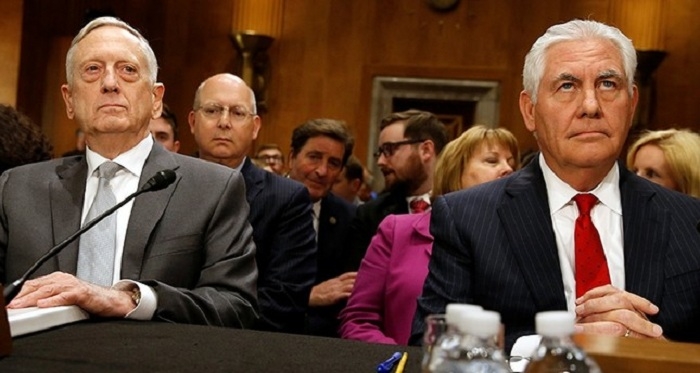U.S. lawmakers are considering updating or repealing the Authorization for the Use of Military Force (AUMF) passed on September 14, 2001, three days after the attacks on New York and Washington by al-Qaida hijackers.
This would help them claw back their constitutional authority to pronounce on decisions of war and peace, but Tillerson and Mattis insisted this would be premature and unnecessary.
"The United States has the legal authority to prosecute campaigns against the Taliban, al-Qaida and associated forces, including ISIS (Daesh), and is not currently seeking any new or additional congressional authorization for the use of force," Tillerson told senators.
"The 2001 AUMF remains a cornerstone for ongoing U.S. military operations and continues to provide legal authority relied upon to defeat this threat."
Mattis agreed, and both senior figures insisted that if Congress seeks to replace the AUMF, it must not do so until another authorization is ready to immediately and seamlessly replace it, to provide legal cover for ongoing operations and the detention of suspects.
"We cannot put a firm timeline on conflict against an adaptive enemy who would hope that we haven't the will to fight as long as necessary," Mattis warned.
"This is a fight against a transnational enemy, one that does not respect international borders and does not place geographic limits on their areas of operations."
Since the AUMF was passed, three presidents in succession have relied on the order's authority — and that of a subsequent 2002 AUMF — as they launched operations against terrorist groups in far-flung battle zones around the world.
Critics have long contended that George W. Bush, Barack Obama and now Donald Trump have exceeded the terms of an authorization initially aimed at Osama bin Laden's al-Qaida organization.
When four U.S. soldiers were killed in an ambush by militants in Niger this month, many Americans were surprised to learn the Pentagon has deployed hundreds of troops in West Africa.
Some lawmakers are now pushing to reassert Congress's right, under the U.S. Constitution, to decide when and where the United States can go to war, in the face of some White House resistance.
On Monday, Mattis and Tillerson brought the message to the Senate Foreign Relations Committee, chaired by Republican Senator Bob Corker, a Trump critic.
Corker said lawmakers were split on the path forward, unable to "bridge the gap" between those who want to craft a new, limited AUMF, and those who believe that "constraining the commander in chief in wartime is unwise."
Senator Ben Cardin, the committee's top Democrat, warned there was increasing opposition to an endless military authorization that essentially greenlights a "global endless shadow war."
In August, both Mattis and Tillerson testified behind closed doors on the same topic and Corker subsequently said they'd been "open" to the idea of revisiting the issue.
Since then, however, Corker has fallen out with Trump and become an open critic of the president, and calls for new oversight on U.S. operations in Africa, the Middle East and Asia have grown.
In September, anti-war Republican Senator Rand Paul attempted to pass an amendment to a funding bill that would have repealed the AUMF.
Democratic committee member Senator Tim Kaine grilled Mattis and Tillerson over the extent of U.S. military operations, in the wake of the deaths of four U.S. service members in Niger this month.
"I think it's a forever war, and I worry deeply about handing the power to presidents to do this without consulting Congress," Kaine said, as he called for extensive public debate and a vote on an AUMF bill he crafted with Republican Senator Jeff Flake.
Flake added: "Congress needs to weigh in."
Paul asked Mattis and Tillerson no questions but instead lectured them about their desire for "blanket" war authority.
He also called on his congressional colleagues to "resist" administrations that claim "the ability to have pre-emptive war, anywhere, any time."
"I am here to say very forcefully it is not your power," Paul told Trump's lieutenants.
U.S. troops are battling an enemy — Daesh terrorists — that didn't exist 16 years ago in a country — Syria — that the U.S. didn't expect to be fighting in. Nor did the 2001 authorization anticipate military confrontations with the Assad regime. Trump in April ordered the firing of dozens of Tomahawk missiles at an air base in central Syria, and American forces in June shot down a Syrian Air Force fighter jet.
Beyond that, Trump has approved a troop increase in Afghanistan, the site of America's longest war, and the U.S. backs a Saudi Arabia-led coalition carrying out airstrikes in Yemen.
But previous attempts to ditch the old authorization and force Congress to craft a new one have failed.
More about: #Trump #Mattis #Tillerson
















































